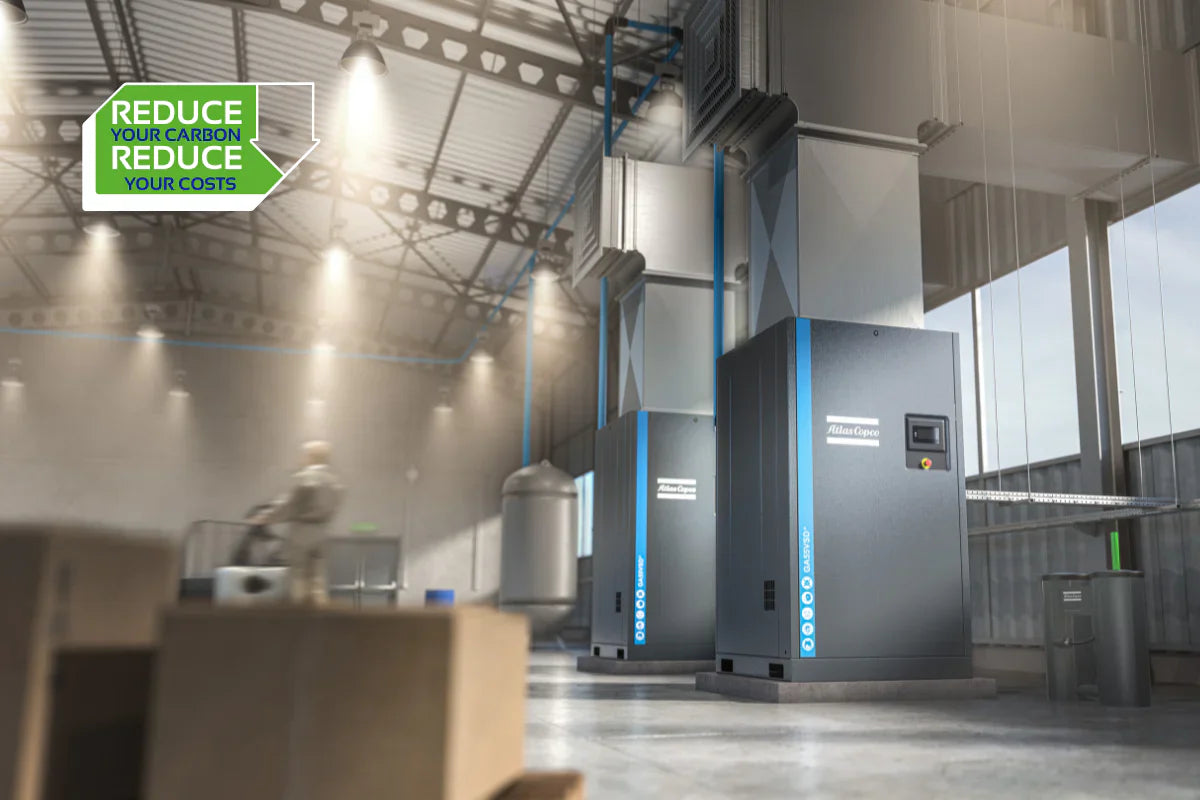At PPS we have been installing VSD air compressors since they were launched by Atlas Copco in 1996. For almost three decades we have seen customers save energy by using this technology across a wide range of industries including food, automotive, engineering, glass, textiles, pharmaceuticals – the list goes on! The point is, whatever your industry, compressed air is a crucial component in many processes, but it can also be a significant source of energy consumption.
That’s why it’s important to choose an energy-efficient compressor that can help you save money and reduce your environmental impact. So, are VSD compressors the most energy efficient on the market? Let’s take a closer look.
What are variable speed drive (VSD) compressors?
VSD compressors are designed to operate at different speeds, depending on the air demand. Unlike fixed-speed compressors, which run at a constant speed regardless of the demand, VSD compressors can adjust the speed of the motor to match the needs of the system. This means that if the air demand is low, the compressor will slow down, and if the air demand is high, the compressor will speed up. By adjusting the speed of the compressor to match the demand, VSD compressors can reduce energy consumption and save money.
What energy savings can I expect with a VSD air compressor?
A modern VSDS air compressor from Atlas Copco can deliver potential energy savings of up to 60% compared to fixed speed equivalents.
Atlas Copco launched their first VSD air compressors in 1996, offering an average saving of around 35% on compressed air costs – a significant sum that had a real impact on our customers’ energy bills.
In 2013, the VSD+ range was launched and the average savings of 35% went up to 50% with this new technology – again representing potential savings of thousands of pounds on a typical annual energy bill.
The launch of the VSDS models in 2022 was another game changer from Atlas Copco offering a further 10% of average savings above the VSD+.
Other benefits of VSD compressors
In addition to energy savings, VSD compressors offer other benefits, such as:
- Accurate Temperature Control: VSD compressors can maintain a consistent temperature, which is important for applications that require precise temperature control, such as pharmaceutical manufacturing.
- Accurate pressure control: a VSD compressor delivers a consistent steady pressure, whereas a fixed speed is set to a range. For example, a VSD can be set at 7 bar, on a fixed speed this must be set as a range between 6.5 bar and 7.5 bar to achieve an average of 7 bar.
- Reduced Noise: VSD compressors operate at lower speeds, which means they produce less noise than fixed-speed compressors. This can be beneficial in noise-sensitive environments, such as hospitals.
- Longer Lifespan: VSD compressors have a longer lifespan than fixed-speed compressors because they operate at lower speeds, which reduces wear and tear on the motor.
The cost of VSD
In terms of the initial capital outlay, a VSD compressor costs more than a fixed speed compressor, BUT up to 80% of the total lifecycle cost of your industrial air compressor is the energy it uses (not the capital cost or the servicing).
The initial purchase price is often quickly recovered through energy savings, in our experience many installations typically have a payback period of less than 2 years. The more variable the air demand, the greater the potential savings. For example, if your air demand fluctuates throughout the day, a VSD compressor could save you a significant amount of money in energy costs.

When not to use a VSD compressor
With modern VSD technology from Atlas Copco there are not many instances where a VSD compressor will not fit the customer application. This is because Atlas Copco VSD compressors deliver market leading energy savings and have the ability to cover the varying demands in flow due to technologically advanced speed control.
On a rare occasion an application may be better suited to a fixed speed. An example of this is where the air demand is low and consistent. In this circumstance the air would need to be stored in a high volume receiver fed by a correctly sized fixed speed compressor.
At the other end of the spectrum, if air demand is consistently high with some variation at the top end the most efficient set up is a fixed speed compressor working with a VSD. The fixed speed compressor covers the base load (100% on load) with the VSD compressor to cover the fluctuating upper demand at a consistent pressure.
Conclusion
Yes, VSD compressors are the most energy efficient option. The jumps in technology and energy savings seen since Atlas Copco introduced the technology in 1996, shows they are the compressors of the future.
To make sure the VSD compressor you choose is the most energy efficient option for your application it must match the pressure and flow required for your process. Data logging and simulation can help you achieve this.
The last thing we want to mention is that we have seen customers switch from one VSD technology to another and achieve savings, so it is not always about comparing fixed speed to VSD but also questioning VSD versus VSD.

